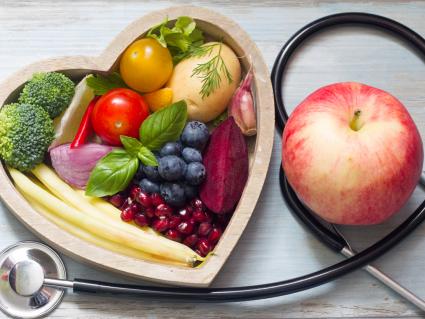Eat Well for Heart Health!

As we observe National Heart Health in February, we recognize that heart disease is still the leading cause of death in both men and women living in the US. While many factors can contribute to heart disease, one of the leading causes is how and what we eat. The Standard American Diet (aka SAD) is comprised of foods and ingredients that contribute or lead to heart disease. This is in part due to the dependence on easy, packaged and processed foods that contain inflammatory ingredients. And when these inflammatory foods make up most of our diet, we lack the nourishing foods that heal and keep our hearts healthy.
To eat for heart health, try to....
avoid foods that harden the arteries and block blood flow. These include fried foods and trans fats. Additionally, sugar intake can contribute to a variety of heart issues so it’s best to keep added sugar to a minimum and limit overall intake of other natural sugars.
Some foods to include for their heart healthy benefits are berries, fatty fish, tomatoes, almonds, and whole grains. For high quality fatty fish, opt for salmon, mackerel, and sardines. Check out seafoodwatch.org for more information on sourcing the safest sustainable seafood. Fish such as wild-caught salmon are rich in omega-3 fatty acids, which can assist in lowering contributing risk factors (including triglycerides and blood pressure).
Lycopene, a natural carotenoid found in tomatoes, has been associated with cardiovascular disease in many studies. Specifically, lycopene works on risk factors including blood pressure and inflammation. To get the biggest nutritional bang for your bite, consume cooked tomatoes regularly, as they contain higher amounts of lycopene than their raw counterparts.
Berries are one of the best sources of antioxidants and studies have shown they may protect heart health in several ways. Try to consume a wide variety on a daily basis, ideally. Some easy ways to include berries are keeping frozen wild blueberries on hand for smoothies and other options such as dried goji berries and pomegranate for snacking to topping salads.
Almonds have been shown to help lower LDL cholesterol, a marker linked to cholesterol. Nuts and seeds in general are nutritional powerhouses that go to bat for the body is many ways. They contain many trace minerals, fiber, and healthy fat, all of which are beneficial. Try to consume a wide variety for not only health benefits but for flavor and texture enjoyment.
And last but not least, whole grains contain ample amounts of fiber, a key ingredient for heart health. Consuming both soluble and insoluble fiber is beneficial but oats are the real MVP when it comes to lowering cholesterol and improving cardiovascular health.
Related Services

Nutritional Counseling
The practitioners at the Center recognize that diet is often the basis for your heath and your potential to heal. Adopting a healthy diet is often the first step towards correcting health problems. Many medical conditions can be treated more effectively when the patient implements specific diets and uses nutritional supplements. These interventions afford fewer complications and side effects than…Nutritional Counseling
Integrative Medicine
Integrative medicine is the blending of conventional medicine with holistic, complementary, and alternative medicine. Integrative Medicine is defined as healing-oriented medicine that takes account of the whole person (body, mind, heart and spirit), including all aspects of lifestyle. It emphasizes the therapeutic relationship and makes use of all appropriate therapies, both conventional and…Integrative Medicine





















